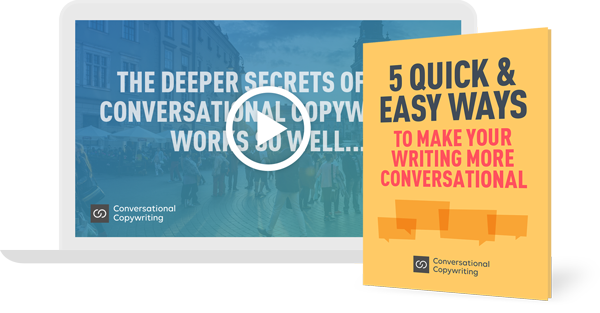
Any kind of language that creates distance between a business and its prospects and customers is a problem.
Put simply, you can’t turn a stranger into a customer by creating distance, by pushing people away.
Much of the time that distance is created by the language a company uses in its business and marketing communications.
First, overly promotional language creates distance simply by stimulating the reader’s defenses. Try to sell at me too hard and I’ll defend myself by stepping back, walking away or ignoring you altogether.
Secondly, overly formal, corporate language, filled with impenetrable jargon creates distance.
This kind of business language simply obscures meaning. And when that happens readers are right to become suspicious. What are you trying to hide from me, and why?
The truth can almost always be told simply.
So why is the language of business so complicated?
Sometimes complex language really is used to obscure or hide meaning. But more commonly I think it’s simply a side-effect of the kind of language people learn at university and business school.
Here are a couple of examples…
And for your amusement, this first one is from the website of a digital advertising agency.
“…we work in agile, cross-functional teams, with our clients as partners and users as our focus to create memorable online experiences that instigate action.”
Seriously? It reads like it’s written in code. It takes a little while to understand what they mean when they talk about “agile, cross-functional teams”. Then there’s the thing about instigating.
You have to sit back and translate it into regular language before you can truly understand the meaning.
I guess they’re trying to say, “We work together with our clients to create marketing that works”.
Here’s another example.
“We believe in making a difference in the lives of Canadians through comprehensive, multi-faceted efforts that tap into the expertise of many external partners and support both sides of the energy balance equation.”
Good to know they’re supporting both sides of the energy balance equation!
Nope, I have no idea what that means. And that’s probably because this text was taken from the website of a major soft drinks company. Well, sugar drinks and junk food.
These are fairly extreme examples, chosen to make a point.
But if you read through most companies’ websites you’ll find language that is overly complicated. And yes, complicated language creates a barrier. It separates the reader from the company or organization.
Ask anyone who spends time on optimizing ecommerce websites what the creation of barriers and distance means… and they’ll tell you it means fewer sales.
The solution? Companies should write in simple, clear language.
And the very best model for simple and clear language is conversation.
When we’re in conversation we don’t talk about agile, cross-function teams, or the energy balance equation. We talk in short sentences, using short words. We keep things simple.
That’s why conversational copywriting is such a powerful force in online marketing.
It keeps things simple, reduces barriers and – as a result – keeps readers engaged for longer and increases conversion rates.
NOTE: If you’d like to add the craft of conversational copywriting to your online writer’s toolbox, find out about the Conversational Copywriting course here…
